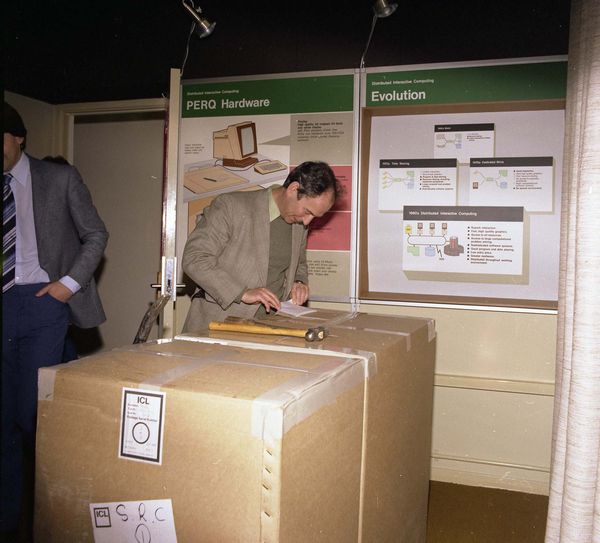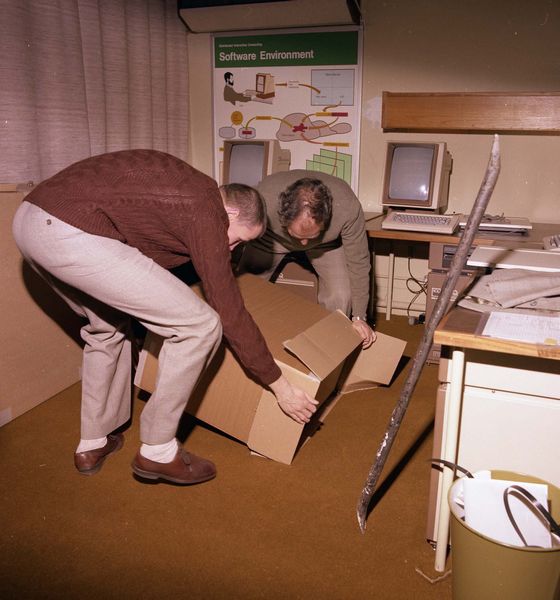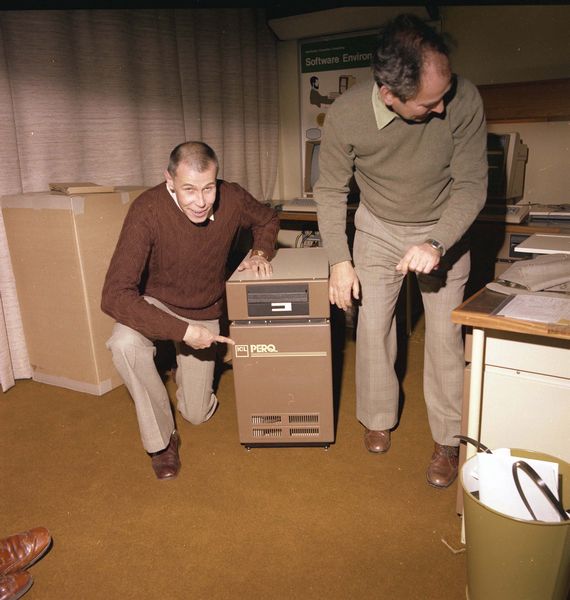Chilton::ACD::PERQ History (original) (raw)
1982
20. ICL MANUFACTURING
20.1 Introduction
The agreement between Three Rivers and ICL gave ICL the ability to manufacture PERQs in the UK and to contribute to any future product design. Manufacturing in the UK was to be done in three phases:
- Assemble Three Rivers made PERQs.
- Fabricate all but the boards in the UK.
- Manufacture complete PERQ in the UK.
The first assembled PERQ was available in December 1981 and the first UK produced PERQ was delivered on 16 February 1982.

First ICL Fabricated PERQ (SRC 1 on Case). Geoff Manning checks the label
Full image ⇗
© UKRI Science and Technology Facilities Council

Bob Hopgood and Geoff Manning Unpack
Full image ⇗
© UKRI Science and Technology Facilities Council

It even has an ICL label
Full image ⇗
© UKRI Science and Technology Facilities Council
ICL soon made progress. Marconi was subcontracted to produce the boards and, apart from the I/O Board requiring more work than anticipated, these were produced according to timescales. Slippage on the I/O Board was about 3 weeks. Some redesign of the cabinet took place.
Although the prototype 1 Mbyte board did not arrive in the UK until January, ICL were able to deliver them by March.
20.2 Kristmas
Very early on, ICL started negotiating with Three Rivers for a reworked version of the original PERQ system with different housing and many changes designed to make the product cheaper and more robust but with similar performance. This system was code-named Kristmas (only 8-character user names plus something for everyone was the motivation for the name). It later became the PERQ2.
ICL was responsible for most of the restyling and the new monitor stand. The aim was to have a prototype by September 1982 and a production system early in 1983.
These timescales were quite tight and there was a tendency to put effort into funding Kristmas rather than making hardware changes to fix minor bugs in the original PERQ.
By March 1982, ICL had received the new 16K writeable control store from Three Rivers and the new A4-size tablet. As the first required cpu changes, ICL were hoping to wait and deliver these with Kristmas rather than retrofit to existing PERQs.
Robb Wilmot had been exerting considerable pressure on Three Rivers to produce a low cost system. As a result the original Kristmas design was split into two options, a K/l system equivalent to the original design, and a stripped down K/2 system which was much lower in cost. This was achieved by removing the floppy disc and making changes to the I/O port configuration available.
A major change from the original PERQ was to have a landscape display of similar resolution to the A4 screen available on Kristmas. This would give 1024 × 1280 addressability on the landscape display.
20.3 TKUP
The Kristmas developments were being done at Three Rivers by a new arrival, Jim Marshall, who had a great deal of experience in productions of this type. Brian Rosen, meanwhile, was concentrating his activities on another machine, TKUP (10K PERQ) which was the brain-child of Robb Wilmot and Ed Fredkin. The aim was to produce a £5K system no later than October 1983. The aim was to produce a system using their own customised gate array chips. Seven chips were being designed both at Three Rivers and also ICL (via their newly acquired Fujitsu connection).
20.4 PERQ Production
In the first nine months of 1982, ICL and Three Rivers between them produced nearly 600 systems split approximately 40% in the UK and 60% in the USA. ICL could have produced more but was effectively producing to order. In June 1982, ICL had 275 orders of which 132 had been delivered.
20.5 Software
Three Rivers had sold all their systems on the basis of the POS operating system and a large proportion of the ICL customers outside the university sector had bought on that basis. The major requirement early on had been the need for a FORTRAN compiler to enhance the PASCAL system available. A joint contract between ICL and Three Rivers was placed with Edinburgh Regional Computer Centre to develop a FORTRAN compiler to run under POS. PERQ systems were loaned to ERCC so that the work could be done. The aim was to have the compiler available by June 1982. An ICL Applications Group at Reading were responsible for putting other application software on the system and had plans to mount a basic graphics package, 2-D draughting system, NAG, a spreadsheet system, and other relevant pieces of software.
20.6 Summary
During 1982, ICL honoured their commitment to build systems in the UK and were putting resources into ensuring that the software available with the POS operating system was sufficient to allow systems to be sold in a variety of areas while the UNIX operating systems developments took place.